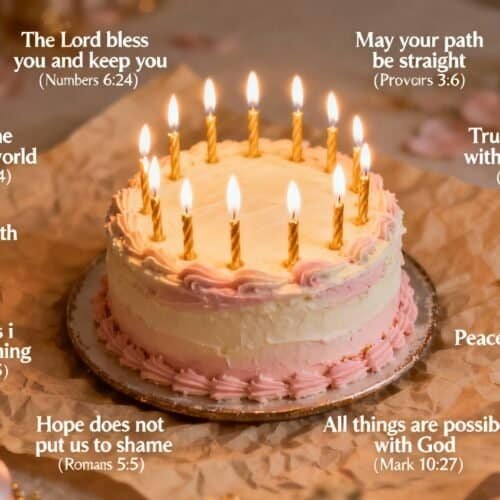
19 Nov Nicodemus in the Bible Key Verses and Lessons
You’ll find Nicodemus in John’s Gospel as a Pharisee and Sanhedrin member who transforms from secret nighttime seeker (John 3:1-21) to bold defender of Christ. His journey illustrates gradual faith development—from questioning Jesus about spiritual rebirth to defending Him before religious leaders (John 7:50-51) and finally preparing His body for burial (John 19:39-42). Nicodemus demonstrates that authentic discipleship can emerge from unexpected places, showing how divine encounters plant seeds that gradually bloom into courageous witness.
Table of Contents
Key Takeaways
- Nicodemus was a Pharisee and Sanhedrin member who secretly visited Jesus at night seeking spiritual truth (John 3:1-2).
- Jesus taught Nicodemus about being “born again” through the Spirit to enter God’s kingdom (John 3:3-8).
- Nicodemus defended Jesus before fellow Pharisees, arguing for fair legal treatment before judgment (John 7:50-51).
- He publicly honored Jesus by bringing expensive burial spices and helping with the burial process (John 19:39-42).
- His journey from secret seeker to public disciple illustrates gradual faith development and incremental courage growth.
Who Was Nicodemus: Pharisee and Ruler of the Jews
Nicodemus emerges from the Gospel of John as one of the most intriguing figures in Jesus’s ministry—a man caught between religious authority and spiritual seeking. John identifies him with three significant descriptors: he’s a Pharisee, a ruler of the Jews, and later called “a teacher of Israel” (John 3:1, 10).
As a Pharisee, you’d recognize Nicodemus as belonging to Judaism’s most influential religious sect, known for their strict adherence to Torah and oral traditions. His status as a “ruler of the Jews” indicates membership in the Sanhedrin, the supreme religious council governing Jewish affairs. This Temple official wielded considerable political and religious power in first-century Palestine.
The designation “teacher of Israel” suggests Nicodemus functioned as a prominent Rabbinic scholar, someone expected to understand Scripture’s deepest meanings. Yet despite his impressive credentials and theological training, he approaches Jesus under night’s cover, revealing the tension between his public position and private spiritual hunger.
The Night Visit: Jesus and Nicodemus Discuss Spiritual Rebirth
When darkness shrouded Jerusalem, this distinguished religious leader made his way to Jesus, initiating one of Scripture’s most profound theological dialogues (John 3:2). You’ll notice Nicodemus chose nighttime deliberately—perhaps to avoid public scrutiny or because his midnight questions demanded privacy for honest inquiry.
The spiritual dialogue began with Nicodemus acknowledging Jesus as a teacher from God, evidenced by miraculous signs. However, Jesus immediately redirected the conversation: “Unless someone is born again, he can’t see the kingdom of God” (John 3:3). This declaration confused Nicodemus, who interpreted it literally—how could one enter their mother’s womb twice?
Jesus clarified the distinction between physical and spiritual birth. You must understand that spiritual rebirth involves being “born of water and the Spirit” (John 3:5). This wasn’t mere reformation but complete transformation. Nicodemus’s midnight questions revealed humanity’s fundamental need: not religious improvement, but supernatural regeneration through divine intervention.

“You Must Be Born Again”: Understanding Jesus’ Teaching
Though Nicodemus struggled to grasp the concept literally, Jesus’ declaration “you must be born again” (John 3:7) represents Christianity’s most fundamental truth about spiritual transformation.
You can understand Jesus wasn’t speaking of physical rebirth but of spiritual regeneration—a complete inner transformation that God initiates through His Spirit.
The Greek term “anothen” carries dual meanings: “again” and “from above,” emphasizing both the repetitive nature and divine origin of this spiritual rebirth.
When you’re born again, you don’t merely reform your behavior; you receive a new nature entirely. This transformation affects your born again identity at its core, creating what Paul later describes as becoming a “new creation” (2 Corinthians 5:17).
Jesus connects this rebirth to entering God’s kingdom, making it essential rather than optional. You can’t earn or manufacture this spiritual rebirth through religious works—it’s God’s sovereign gift received through faith in Christ‘s redemptive work.
Nicodemus Defends Jesus Before the Sanhedrin
You’ll find Nicodemus courageously challenging his fellow Pharisees’ rush to judgment in John 7:50-51, where he questions whether their law condemns a man without first hearing him and knowing what he’s doing.
His intervention reveals someone willing to risk his prestigious position among the religious elite for the sake of proper legal procedure and, implicitly, for Jesus’ defense. This moment demonstrates Nicodemus’s growing faith journey from secret nighttime inquirer to public defender, even when facing potential ostracism from his peers.
Questioning Pharisaic Legal Process
As tensions escalate between Jesus and the religious authorities, Nicodemus emerges from the shadows of his earlier nighttime encounter to defend principles of justice within the very institution he serves.
In John 7:50-51, you witness Nicodemus challenging his fellow Pharisees with a pointed question: “Does our law judge a man without first hearing him and knowing what he’s doing?” This isn’t mere procedural nitpicking—Nicodemus invokes foundational Pharisaic procedure requiring proper legal scrutiny before condemnation.
His intervention reflects Deuteronomy 1:16-17‘s mandate for fair judgment and echoes rabbinic principles demanding thorough investigation.
You see Nicodemus risking his reputation by defending due process, subtly protecting Jesus while maintaining his position within the Sanhedrin. His question exposes the council’s rush to judgment, highlighting their departure from their own legal standards.
Risking Personal Standing
When Nicodemus speaks up in John 7:50-51, he places his entire social and religious standing on the line for a teacher his colleagues increasingly view as a dangerous threat. You witness him questioning whether Jewish law permits condemning someone without proper hearing—a procedural challenge that distances him from the Sanhedrin’s predetermined verdict. This reputation risk demonstrates remarkable moral courage, as Pharisees maintained their authority through collective unity against perceived threats to religious order.
Nicodemus’s intervention reveals the internal cost of discipleship. You see him navigating between his growing conviction about Jesus and his established position within Judaism’s power structure. His willingness to advocate for legal fairness, despite mounting opposition, shows how genuine encounters with Christ compel believers to speak truth even when silence would preserve personal advantage.
Gradual Faith Development
Nicodemus’s defense of Jesus before the Sanhedrin marks a pivotal moment in his spiritual journey, revealing how genuine faith often develops incrementally rather than through sudden transformation.
In John 7:50-51, you see Nicodemus courageously challenging his colleagues: “Does our law judge a man without first hearing from him?” This public intervention demonstrates significant spiritual growth from his secret nighttime visit.
While he doesn’t yet openly declare Jesus as Messiah, his willingness to advocate for fair treatment shows incremental trust building.
You’ll notice Nicodemus risks his reputation among peers who’ve already decided Jesus’s fate.
His measured yet bold stance illustrates how authentic faith can emerge gradually through careful observation and moral conviction rather than dramatic conversion experiences.
The Secret Disciple: Nicodemus’s Hidden Faith Journey
You’ll notice Nicodemus’s spiritual journey unfolds through three distinct encounters that reveal his gradual transformation from fearful inquirer to courageous defender.
His initial night visit demonstrates both genuine seeking and calculated caution, as he approaches Jesus under darkness’s cover to avoid detection by his Pharisaic colleagues. This pattern of secret discipleship reflects the complex position of religious leaders who found themselves drawn to Christ’s teachings while navigating the political dangers of open association with him.
Night Visit to Jesus
Under the cover of darkness, Nicodemus deliberately chose to approach Jesus, revealing both his genuine spiritual hunger and his calculated concern for his reputation among the Jewish religious establishment.
This midnight encounter demonstrates the tension between spiritual curiosity and social pressure that many believers face. You’ll notice that Nicodemus addresses Jesus as “Rabbi” and acknowledges His divine credentials, saying “no one can do these signs that you do unless God is with him” (John 3:2).
His secret questions about spiritual rebirth reflect a sincere seeker wrestling with traditional Judaism’s limitations.
The nighttime setting wasn’t merely practical—it symbolized Nicodemus’s spiritual condition, moving from darkness toward the light of Christ’s truth through this transformative conversation.
Fear of Religious Leaders
Although Nicodemus recognized Jesus’s divine authority, his position as a Pharisee and member of the Sanhedrin created profound internal conflict between his emerging faith and his standing within Judaism’s power structure. You can observe how social anxiety permeated his interactions with Christ—he approached Jesus under darkness’s cover to avoid detection by fellow religious authorities. This peer pressure from the Sanhedrin wasn’t merely professional concern; it threatened his livelihood, reputation, and social standing within Jewish society.
John’s Gospel reveals Nicodemus’s gradual progression from secret inquirer to cautious defender. When the Sanhedrin condemned Jesus without proper hearing, Nicodemus courageously questioned their procedures (John 7:50-51). Though his colleagues dismissed him with contempt, he’d begun prioritizing divine truth over human approval, demonstrating faith’s transformative power over fear.
Bold Public Defense
Nicodemus’s most dramatic transformation occurred when he abandoned secrecy entirely and publicly identified himself with the crucified Christ. When Joseph of Arimathea requested Jesus’s body, Nicodemus joined him with seventy-five pounds of burial spices (John 19:39). This wasn’t merely charitable assistance—it was bold public declaration. By participating in Christ’s burial, Nicodemus risked his Sanhedrin position, social standing, and religious authority. His actions constituted a public apology for his previous cowardice and secret discipleship.
The expensive myrrh and aloes demonstrated genuine devotion, while his visible presence at Golgotha showed courage. Though his Sanhedrin membership might’ve provided some legal immunity from Roman persecution, it couldn’t protect him from Jewish ostracism. Nicodemus’s transformation from fearful inquirer to courageous confessor illustrates how genuine faith ultimately demands public witness, regardless of personal cost.
Preparing Christ’s Body: Nicodemus at the Crucifixion
Following Christ’s crucifixion, Nicodemus emerges from the shadows of his previous nighttime encounters to perform one final, decisive act of discipleship. In John 19:39-42, you witness his transformation from secret seeker to public mourner as he brings “about seventy-five pounds of myrrh and aloes” for Jesus’ burial rites.
This wasn’t merely ceremonial—you’re observing costly discipleship in action. The substantial quantity of spices preparation demonstrates both Nicodemus’s wealth and his reverence for Christ as king. Working alongside Joseph of Arimathea, he participates in the cedar wrapping of Jesus’ body according to Jewish custom.
The tomb placement becomes Nicodemus’s final recorded act of devotion, marking his complete journey from darkness to light. You see how his initial nighttime questions culminate in this daylight declaration of allegiance. Through burial preparation, Nicodemus publicly identifies with the crucified Christ, risking his reputation and position for the teacher who’d promised eternal life.
From Darkness to Light: Nicodemus’s Spiritual Transformation
When you trace Nicodemus’s journey through John’s Gospel, you discover a profound metamorphosis that mirrors the spiritual rebirth Christ described in their first encounter. His nocturnal revelation in John 3 planted seeds that would eventually bloom into genuine faith.
Nicodemus’s transformation from secret seeker to devoted disciple reveals how divine encounters plant seeds that gradually bloom into authentic faith.
You witness this inner transformation through his progressive boldness. Initially approaching Jesus under darkness’s cover, Nicodemus later defends Christ publicly before the Sanhedrin (John 7:50-51), risking his reputation and standing. This marked a crucial turning point in his spiritual awakening.
His final appearance reveals complete personal renewal. Bringing seventy-five pounds of burial spices to honor Jesus’s body demonstrates costly devotion—a stark contrast to his earlier timidity. The abundance of spices suggests deep reverence and love.
Nicodemus’s journey from secret seeker to public disciple illustrates how authentic encounters with Christ catalyze genuine transformation. His story encourages you that spiritual growth often occurs gradually, moving from questioning to commitment.
Lessons in Courage: Standing Up for Truth Against Opposition
Courage emerges as one of Scripture’s most demanding virtues when it requires defending unpopular truth before hostile audiences. Nicodemus demonstrates this progression from secret inquiry to public advocacy, modeling how you can develop moral courage through gradual steps of faith.
When the Pharisees condemned Jesus without proper investigation, Nicodemus challenged their prejudice: “Does our law judge a man without first giving him a hearing?” (John 7:51).
Though seemingly modest, this question constituted an act of civil disobedience against religious authorities determined to silence Jesus.
You’ll notice Nicodemus’s final transformation at Christ’s crucifixion, where he publicly assisted Joseph of Arimathea in Jesus’s burial (John 19:39-40).
This decisive action required extraordinary moral courage, as it meant openly identifying with a condemned criminal before the very council that had orchestrated Jesus’s execution.
Nicodemus teaches you that courage develops incrementally—from private questioning to gentle challenges to bold public stands for truth.
Modern Applications: What Nicodemus Teaches Us About Faith
Though centuries separate us from Nicodemus’s nocturnal encounter with Jesus, his journey from secret seeker to public disciple reveals timeless principles that directly apply to your modern faith experience.
Nicodemus demonstrates that authentic faith often begins with private trust rather than public declaration. His initial nighttime meeting shows you don’t need perfect understanding before approaching Christ—honest questions and genuine seeking matter more than having all the answers.
In our age of secular skepticism, Nicodemus’s intellectual wrestling provides a model for engaging faith thoughtfully. He didn’t abandon reason but allowed divine revelation to transform his worldview.
His progression from secret disciple to bold advocate teaches that spiritual growth requires patience with yourself while remaining open to truth.
Most significantly, Nicodemus shows that your faith journey isn’t defined by how it begins but by how it develops. His final act of public devotion proves that quiet beginnings can yield courageous conclusions.
Frequently Asked Questions
What Happened to Nicodemus After Jesus’ Resurrection?
You won’t find explicit biblical accounts of Nicodemus’s post resurrection visit with Jesus, as Scripture doesn’t record such encounters.
However, you’ll notice his transformation from secret inquirer to bold disciple through his burial oversight of Christ’s body with Joseph of Arimathea.
His final biblical appearance shows he’d moved from darkness to light, courageously providing expensive spices for Jesus’s burial preparation.
Did Nicodemus Ever Publicly Declare His Faith in Jesus?
You won’t find explicit evidence of Nicodemus making a public confession of faith in Jesus throughout Scripture.
While his actions suggest private belief—defending Jesus before the Pharisees and participating in his burial—these don’t constitute formal public declarations.
John’s Gospel presents Nicodemus’s journey from secret inquirer to bold defender, yet stops short of recording any definitive public confession during Jesus’s ministry or afterward.
How Did Other Pharisees React to Nicodemus’s Defense of Jesus?
You’ll find the Pharisee reactions recorded in John 7:50-52, where Nicodemus’s colleagues responded with sharp rebuke during Temple debates.
When he suggested they shouldn’t condemn Jesus without proper hearing, they sarcastically asked, “Are you also from Galilee?” They dismissed his legal reasoning and declared no prophet comes from Galilee.
Their reaction reveals hostility toward anyone questioning their predetermined judgment against Jesus, even fellow Pharisees.
What Was the Cost of the Spices Nicodemus Brought for Burial?
The text doesn’t specify the exact spice value, but you can understand the significance through ancient burial practices.
Nicodemus brought a hundred pounds of myrrh and aloes—an extraordinary amount that would’ve cost a fortune.
This quantity far exceeded normal burial practices, suggesting immense expense.
You’re seeing Nicodemus’s wealth and devotion demonstrated through this lavish gift, indicating his deep respect for Jesus despite potential social consequences.
Did Nicodemus Face Persecution for Helping Prepare Jesus’ Body?
Scripture doesn’t explicitly record persecution against Nicodemus for helping prepare Jesus’ body. However, you’d recognize he faced significant social stigma and legal risk.
As a Pharisee and Sanhedrin member who’d previously defended Jesus, his public association with crucified Christ would’ve brought severe consequences from Jewish leadership. His secretive nighttime meetings suggest he understood the dangers, yet he courageously participated in Jesus’ burial despite potential ostracism.
Conclusion
You’ve witnessed Nicodemus’s transformation from secret seeker to bold disciple through careful examination of John’s Gospel. His journey from nighttime questioner to public defender reveals how genuine faith develops gradually, often against social pressure. You’ll find that Nicodemus’s progression from intellectual curiosity to sacrificial love demonstrates authentic discipleship doesn’t require immediate perfection. His story challenges you to examine whether you’re hiding your faith or courageously standing for Christ despite potential consequences.












No Comments